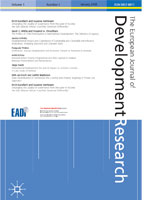
The impact of long-term finance on job quality, investments and firm performance: cross-country evidence
Sommer, ChristophExternal Publications (2024)
in: European Journal of Development 36 (4), 747-776
DOI: https://doi.org/10.1057/s41287-023-00611-y
Open access
Despite its importance for development, long-term finance is particularly scarce in countries with lower income levels. This not only results in unrealized growth and employment creation, but may also undermine a broader shift towards better jobs. After all, many long-term investments comprise investments in labor that have the potential to contribute to improvements in job quality. This paper uses more than 17,000 firm-level observations from 73 mostly low- and middle-income countries to provide first empirical evidence of the extent to which LTF affects the quality of jobs. Additionally, it looks into effects on investments and firm performance. The findings, based on inverse probability weighted regression adjustment, indicate that long-term finance increases the likelihood of formal training by 4.4 to 4.8 percentage points, raises average wage by 4.1 percentage points and the share of permanent employees by 1.3 percentage points. Effects are also significant for investments in fixed assets and process innovation as well as for employment and sales growth. The fact that the positive effects on job quality increase with loan maturities underlines the importance of longer-term finance for better jobs. Despite several robustness checks, it cannot be ruled out completely that unobservable variables affect the estimation of effect sizes.

